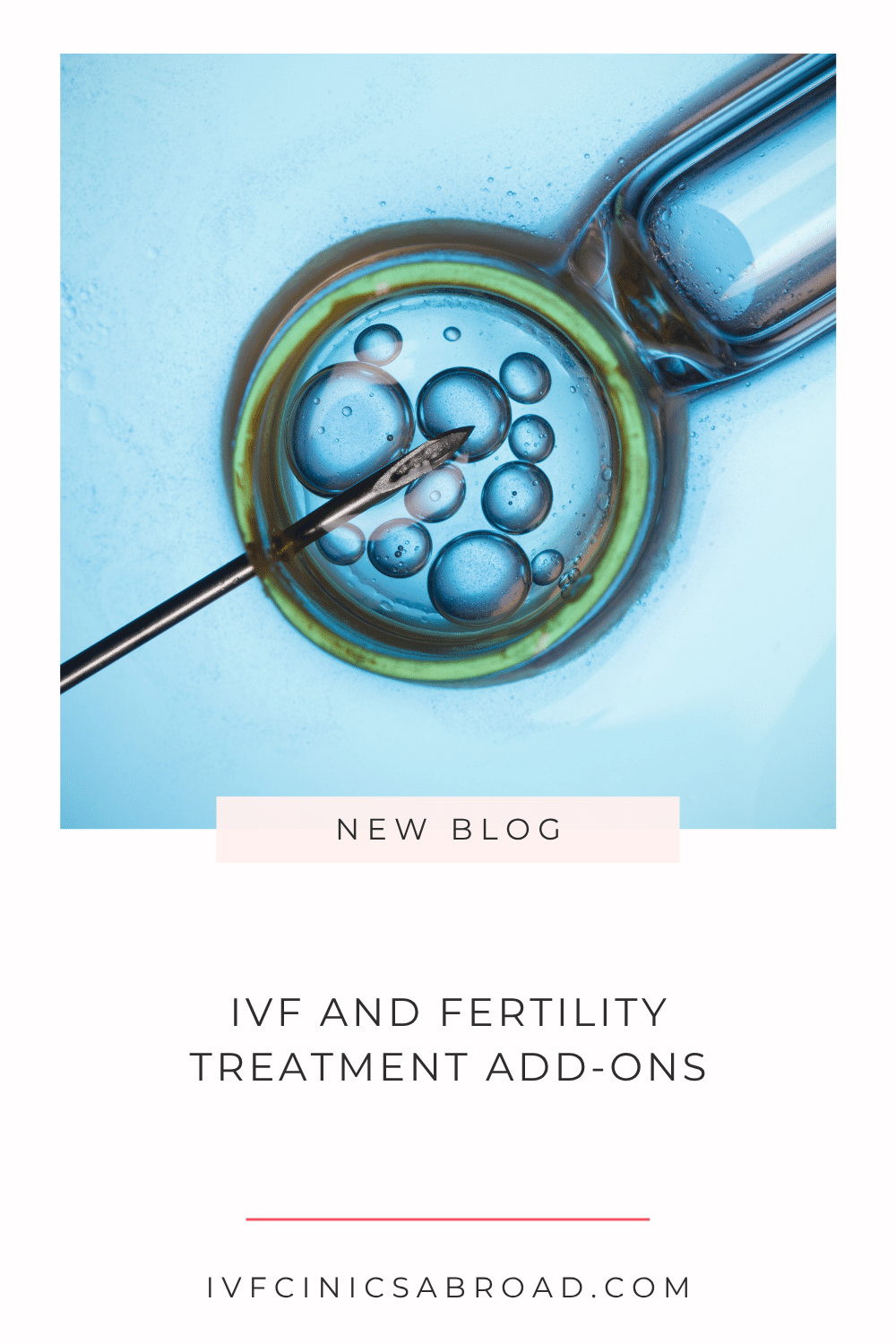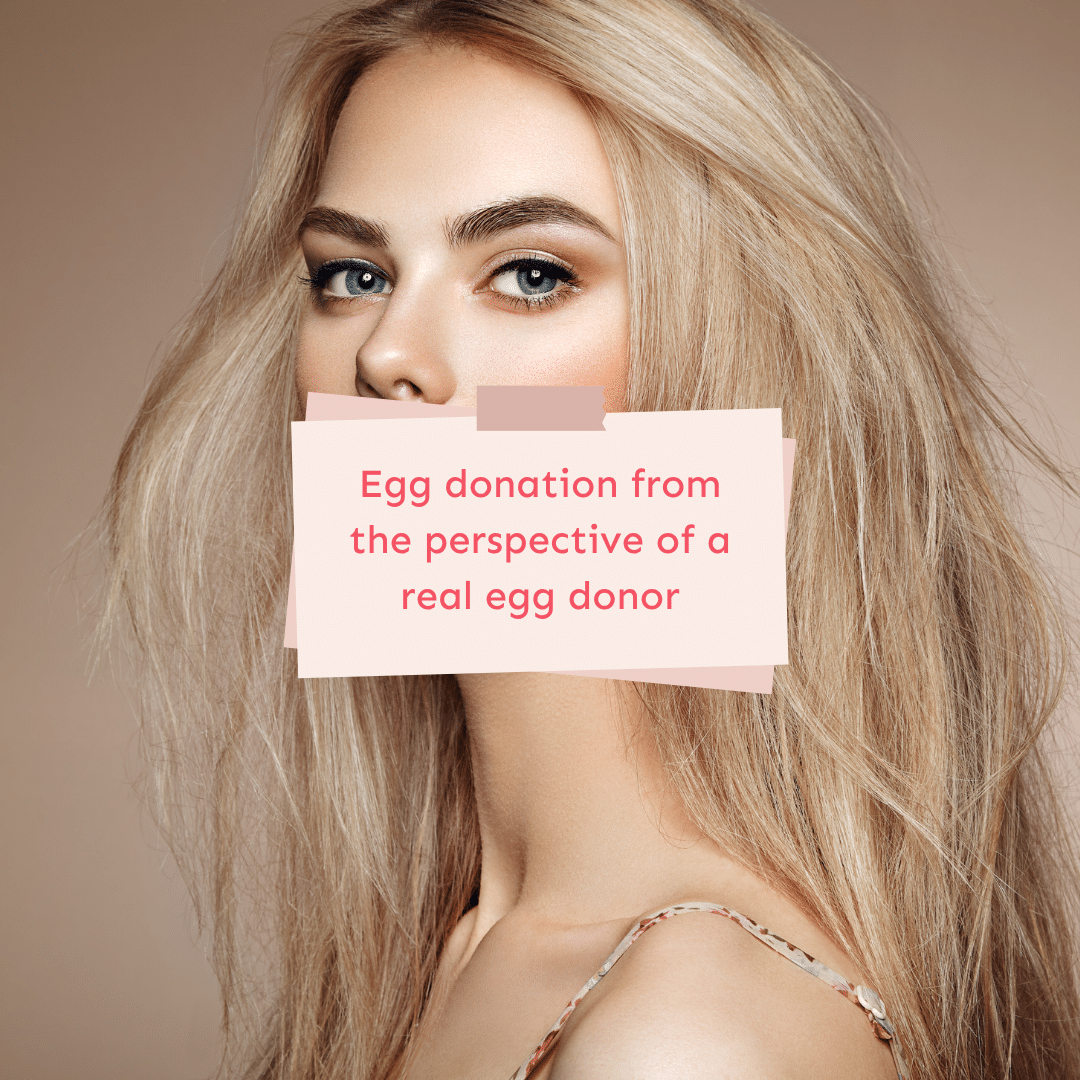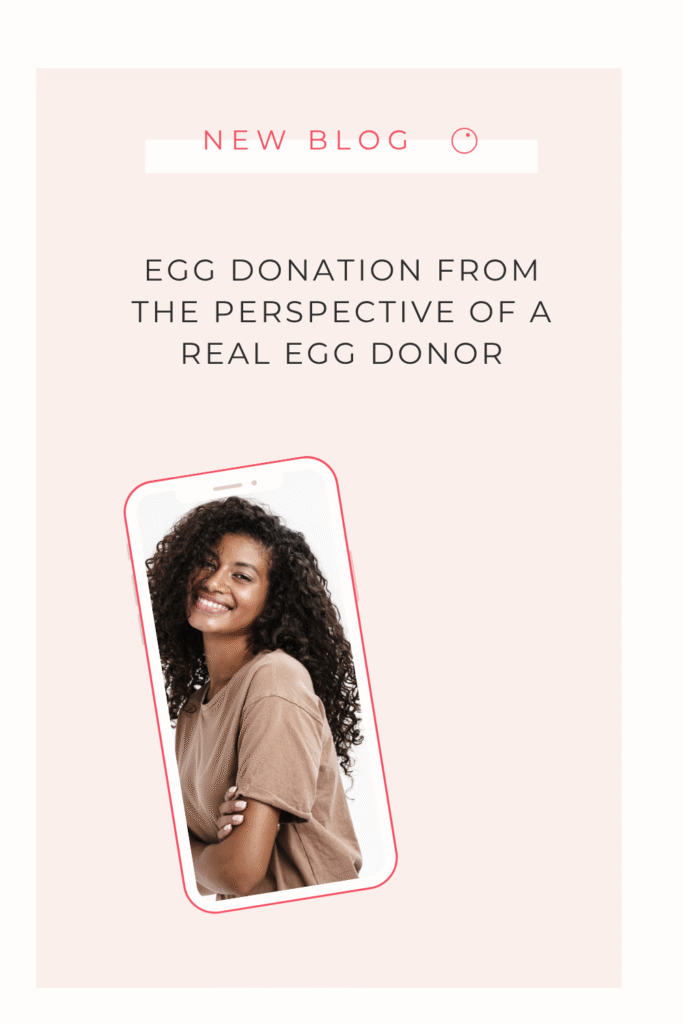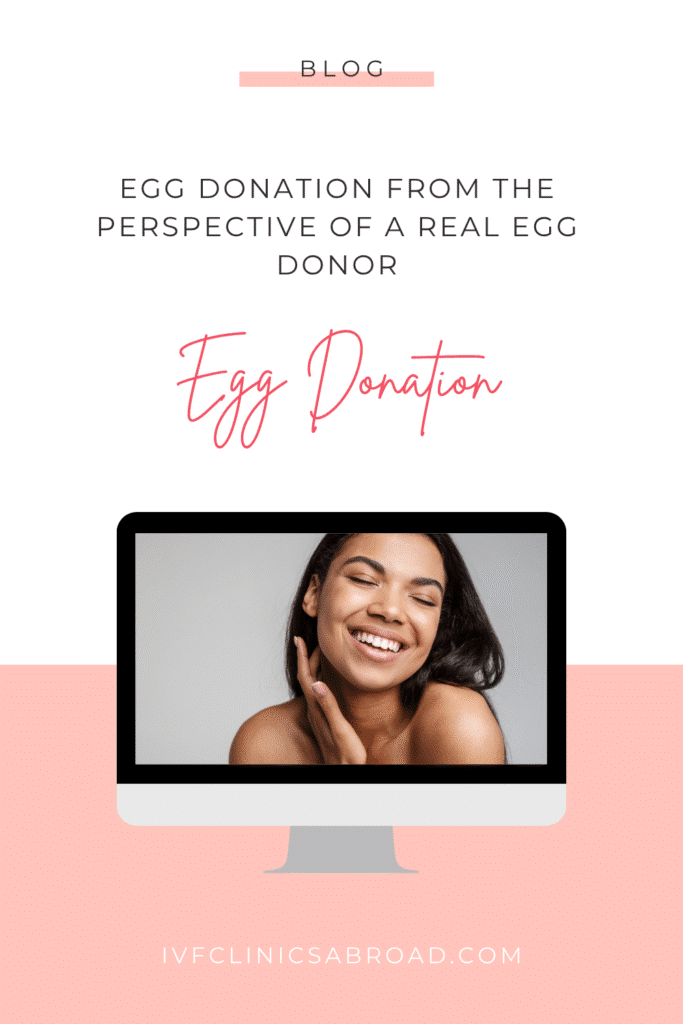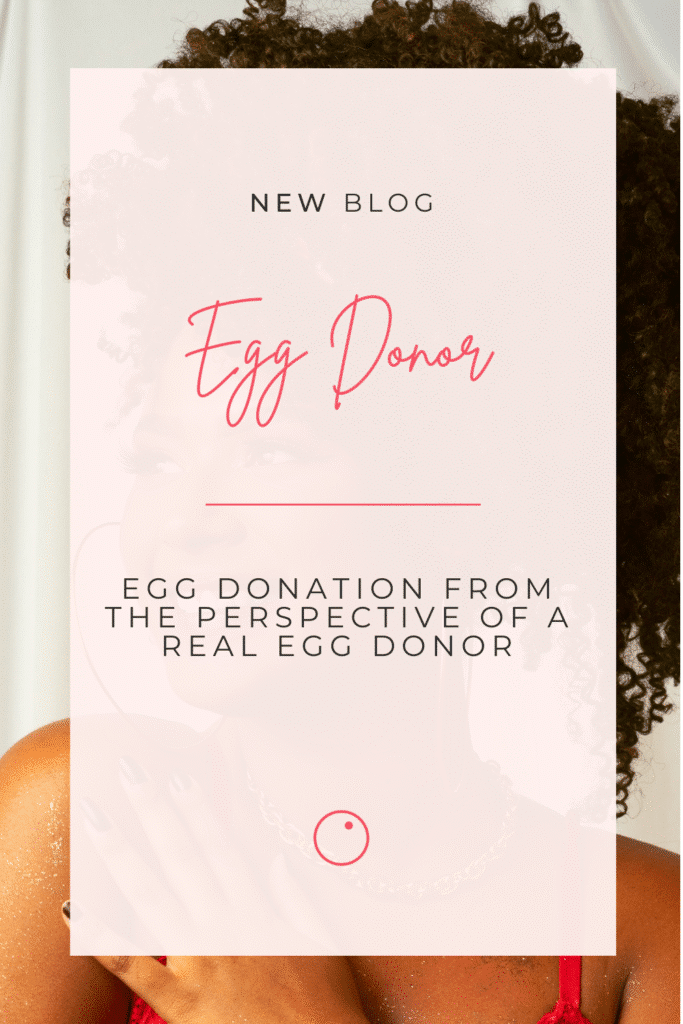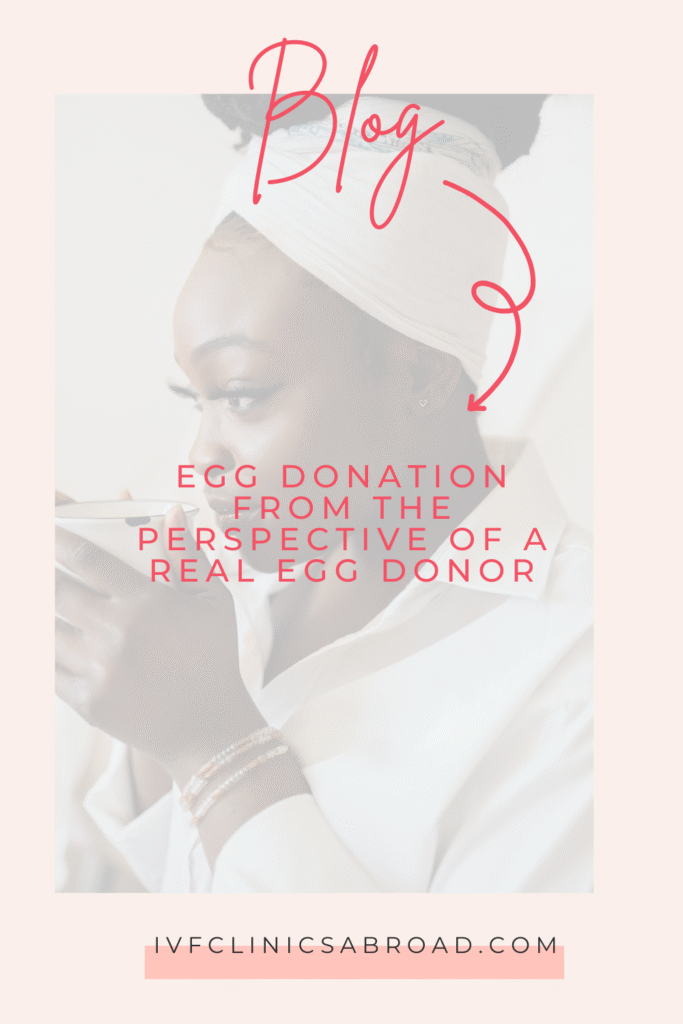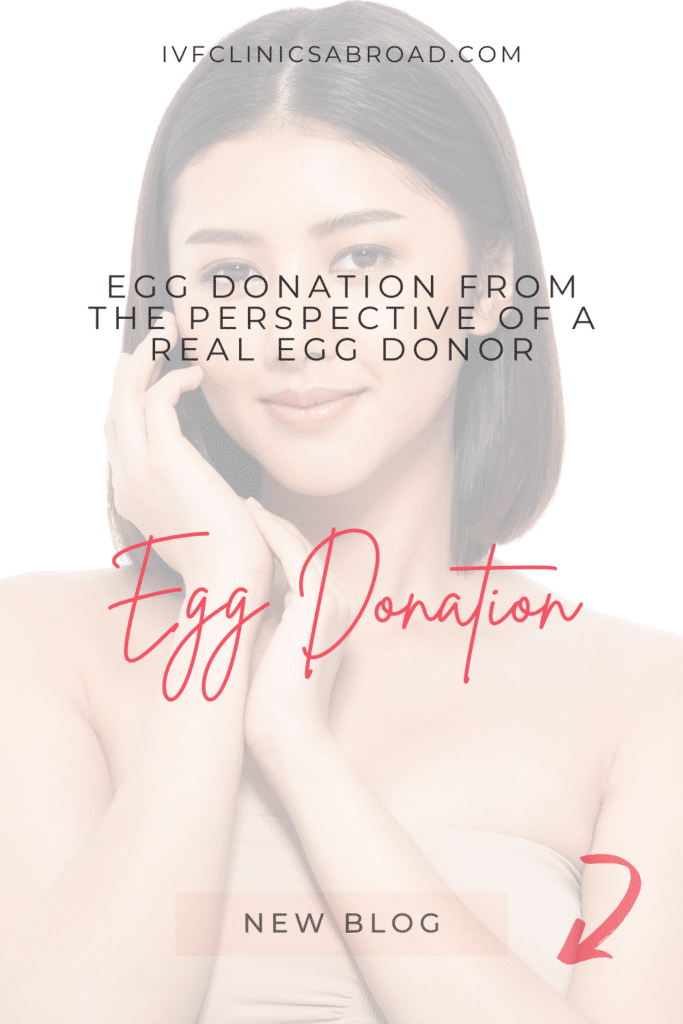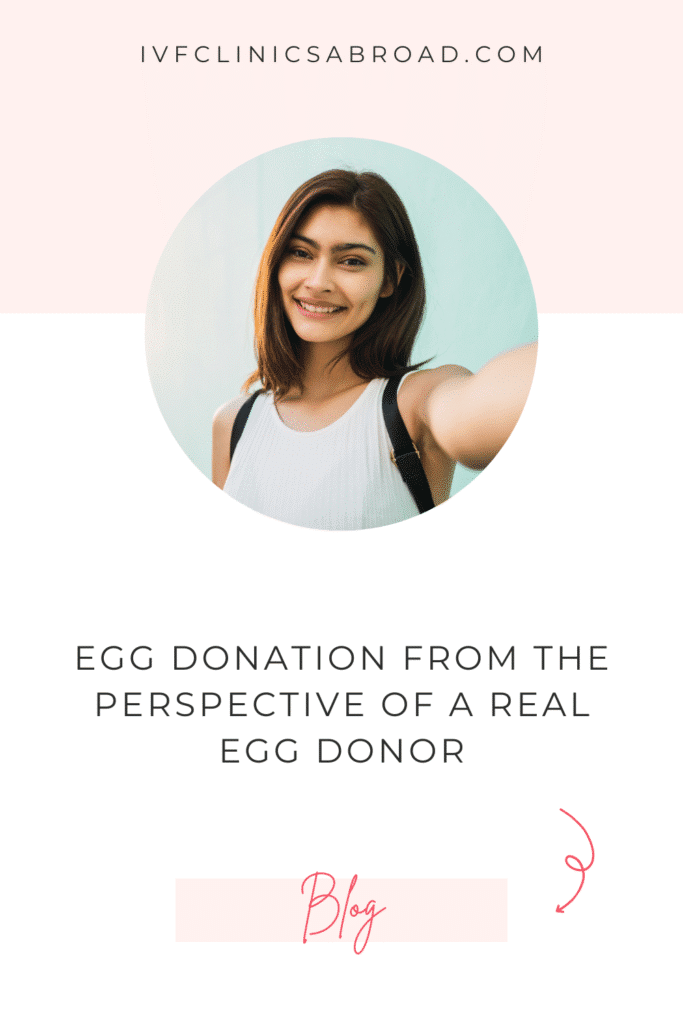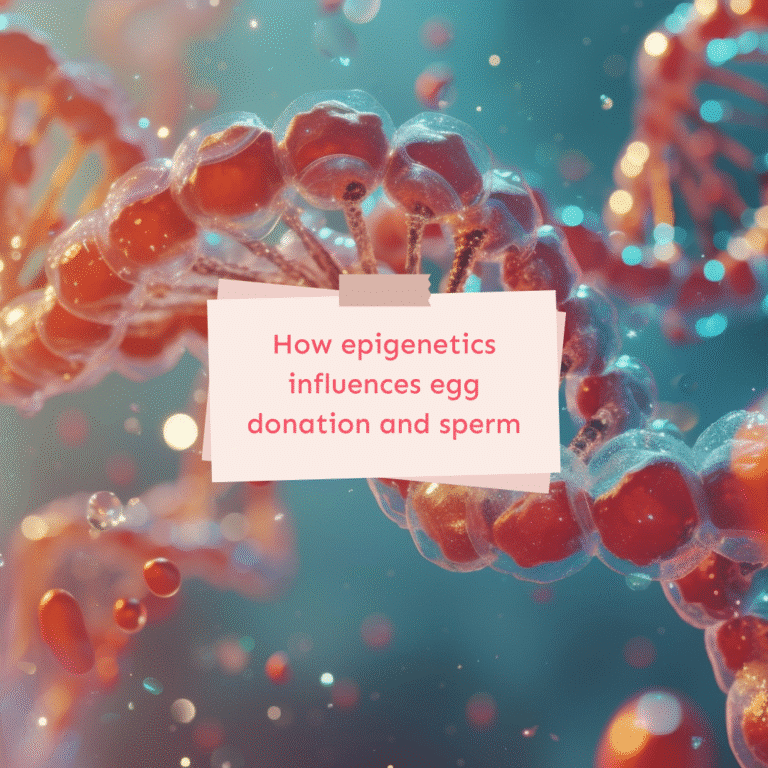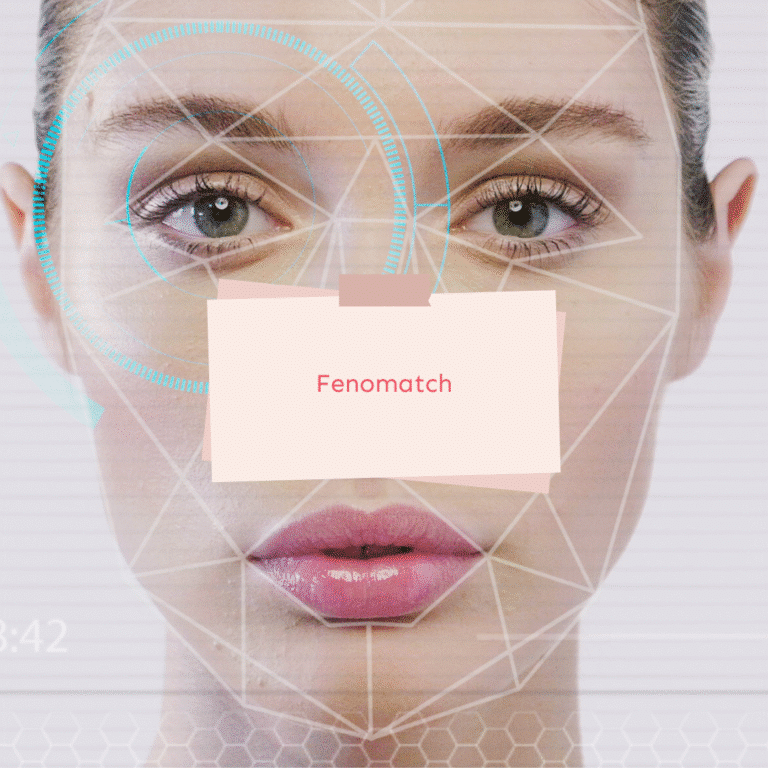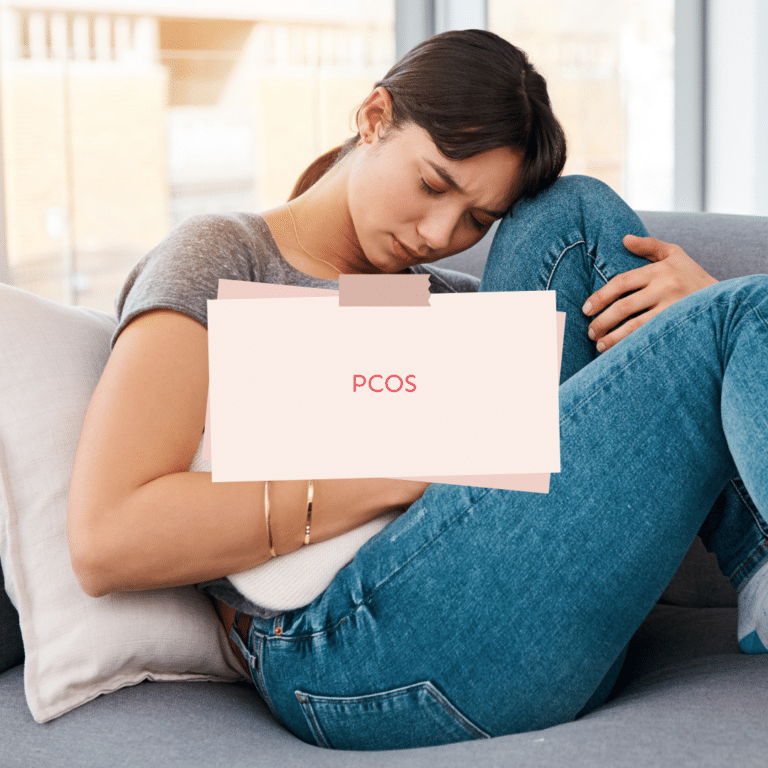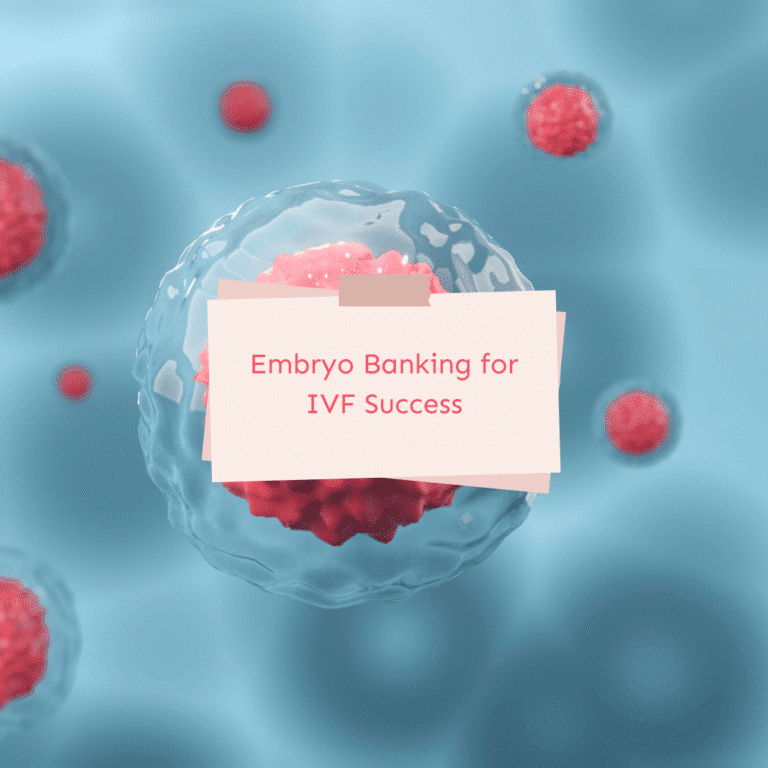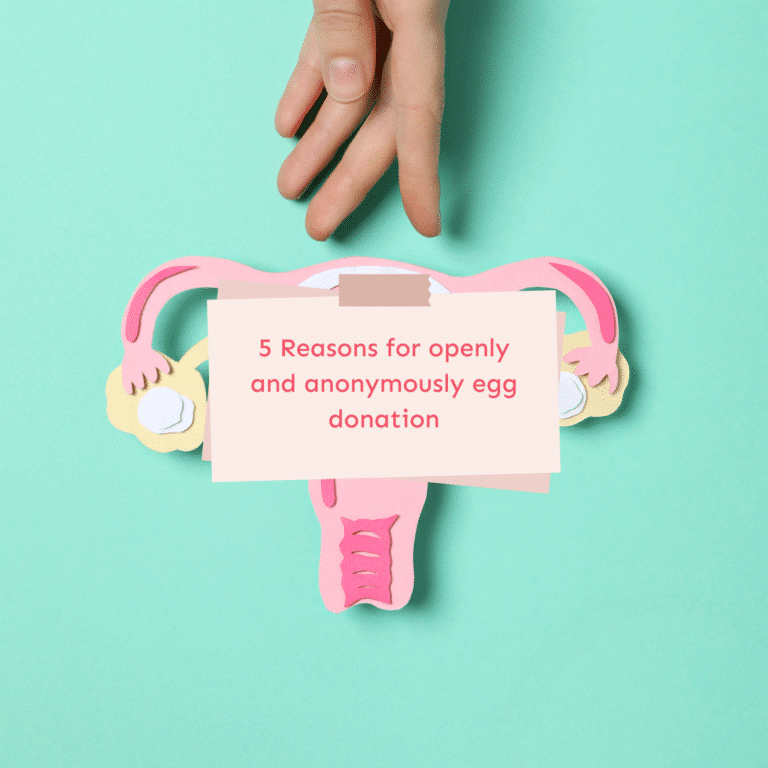La donación de óvulos desde la perspectiva de una auténtica donante de óvulos, Cómo es hacerse donante de óvulos - y lo que las receptoras no suelen oír
La donación de óvulos es algo de lo que la mayoría de la gente ha oído hablar, pero que muy pocos comprenden realmente. Cuando hablamos de ello, a menudo nos centramos en la receptora: la mujer o la pareja que lucha por concebir, el tratamiento médico y el esperanzador resultado. Pero esta historia tiene otra cara. En algún lugar, en silencio y sin que se le preste mucha atención, otra mujer lo está haciendo posible: la donante de óvulos.
Este artículo comparte la experiencia de una joven que decidió donar sus óvulos. No por presión o necesidad económica, sino porque quería ayudar a alguien a ser padre. Entonces tenía 23 años, y su decisión no sólo dio forma a su propia vida, sino también al comienzo de la historia de otra familia.
Te llevamos a través de todo el proceso desde su punto de vista: cómo empezó, qué implicaba el ciclo de donación, qué sintió y qué le quedó después de todo. Si estás pensando en hacerte donante de óvulos, o si te estás preparando para un tratamiento de FIV con óvulos de donante, esta historia puede ofrecerte una perspectiva que los folletos médicos no pueden ofrecerte.
No es un artículo médico. Es personal, pero muestra cuánto cuidado, tiempo y reflexión hay detrás de cada donación de óvulos. Y lo importante que es escuchar también las voces de las donantes.
Por qué las mujeres se hacen donantes de óvulos
No todas las mujeres que donan sus óvulos lo hacen por la misma razón. Para algunas, se trata de dar a otra persona la oportunidad de formar una familia. Para otras, puede formar parte de su propio viaje: un capítulo de la vida en el que se sienten sanas, fuertes y capaces de ofrecer algo profundamente significativo. Pero sea cual sea el motivo, convertirse en donante de óvulos no es una decisión que se tome a la ligera. Implica tiempo, compromiso y, a menudo, un trabajo emocional silencioso en segundo plano.
La mujer cuya historia compartimos aquí tenía 23 años cuando decidió donar. No la empujaron a ello. Había visto lo que la infertilidad puede hacer a la gente y simplemente quería ayudar. Lo que no esperaba era lo mucho que aquella experiencia moldearía su propia visión de la paternidad, la fertilidad y la silenciosa generosidad que hay detrás de la donación reproductiva.
Los donantes suelen ser invisibles en las conversaciones sobre reproducción asistida. Pero tienen una perspectiva única, que merece ser escuchada. Comprender sus motivaciones forma parte de la comprensión de la imagen completa de la donación de óvulos.
¿Qué motiva a alguien a donar sus óvulos?
Cuando tomó la decisión de donar, no fue por dinero. "Simplemente pensé: si puedo ayudar a otra persona a concebir, ¿por qué no iba a hacerlo yo?", nos dijo. Por supuesto, el proceso de donación conllevó dificultades. Tuvo que acudir a citas varias veces por semana, inyectarse hormonas y reorganizar su vida privada durante semanas. Pero a pesar de todo, nunca dudó de su decisión.
Cada donante tiene sus propias razones. Algunas han visto a amigas cercanas luchar contra la fertilidad. Otras se sienten atraídas por la idea de dar algo profundamente personal, pero no de una forma que requiera una implicación continua. Algunas lo ven como una forma de compartir lo que su cuerpo puede hacer -un óvulo sano, una posibilidad biológica- con alguien cuyo cuerpo necesita ayuda.
Lo importante es que la decisión sea voluntaria, bien informada y tomada con plena comprensión de los aspectos emocionales y físicos de la donación de óvulos.
La donación de óvulos como parte de la atención reproductiva
La donación de óvulos no es sólo biología: es una parte de la atención reproductiva que afecta a la ética, la identidad y las consecuencias a largo plazo. En muchos países, forma parte de lo que las clínicas de fertilidad ofrecen a las mujeres que no pueden utilizar sus propios óvulos. Algunas receptoras tienen más de cuarenta años, otras padecen enfermedades genéticas y algunas han pasado por ciclos de FIV fallidos. En todos estos casos, los óvulos donados pueden ofrecer una nueva oportunidad.
Pero lo que a menudo falta en la conversación es lo fundamental que es realmente la donante en este tipo de tratamiento. Sin ella, no hay ciclo. No hay embrión. No hay transferencia. La donante puede permanecer sin nombre, incluso anónima, pero su contribución es fundamental para el éxito del ciclo de tratamiento.
Algunos países regulan estrictamente la donación de óvulos y esperma. Otros permiten una mayor apertura, en la que se puede conocer a la donante o ponerse en contacto con ella más adelante. En cualquier caso, es crucial que las donantes sean tratadas no sólo como un recurso médico, sino como seres humanos que toman una decisión poderosa e íntima.
Los pasos médicos del ciclo de tratamiento
Convertirse en donante de óvulos no ocurre de la noche a la mañana. Antes de que la donación pueda tener lugar, hay que dar muchos pasos para garantizar que tanto la donante como la receptora estén seguras, desde el punto de vista médico, legal y emocional. Las clínicas tienen el deber de proteger a todos los implicados, y eso significa dedicar tiempo a evaluar, preparar y guiar a la donante a lo largo de todo el ciclo de tratamiento.
Desde los exámenes médicos hasta la estimulación hormonal, cada etapa se planifica y supervisa cuidadosamente. Aunque el proceso es temporal, el nivel de atención requerido es cualquier cosa menos superficial. La mayoría de los donantes pasan varias semanas en estrecho contacto con la clínica, a menudo reorganizando partes de su vida cotidiana para que todo sea posible.
Desde la primera selección hasta el emparejamiento con un destinatario
Cuando una mujer expresa su interés en ser donante, se le suele pedir que rellene un cuestionario detallado. Incluye preguntas sobre su historial médico, antecedentes familiares y estilo de vida. Dependiendo de la clínica o del país, las evaluaciones psicológicas también forman parte de los primeros pasos, para asegurarse de que se comprende plenamente la decisión y de que se da realmente el consentimiento informado.
Después de esto, comienza una ronda de pruebas médicas. Se realizan análisis de sangre, niveles hormonales y pruebas genéticas. Un elemento clave es el cribado de donantes, que incluye la comprobación de afecciones hereditarias y enfermedades infecciosas. También se realiza una ecografía para evaluar el funcionamiento de los ovarios, no sólo en general, sino en cuanto a su posible respuesta a la estimulación.
Una vez aceptada, la donante entra en una especie de fase de espera. Su perfil -que a veces incluye fotos- se añade al sistema interno de la clínica, donde se empareja a las receptoras en función del parecido físico y la compatibilidad médica. La donante no elige a la receptora, pero siempre se le pregunta si está disponible y dispuesta antes de confirmar un ciclo.
Algunas clínicas permiten la donación identificable, lo que significa que el niño puede acceder a información sobre el donante una vez alcanzada cierta edad. Esto no es igual en todas partes: el marco legal depende del país. En algunos lugares, la información identificable puede compartirse a partir de los 16 años, pero en la mayoría de los casos está disponible a los 18. Otros países siguen confiando en la donación anónima, en la que toda la información identificativa sigue siendo confidencial. En cualquier caso, el proceso de emparejamiento es un momento crucial: marca la transición de la intención a la preparación real.
Preparación hormonal y recuperación de óvulos donados
Una vez confirmada la compatibilidad, comienza la fase médica. El donante recibe un plan de medicación - suele incluir inyecciones hormonales que estimulan los folículos ováricos para que maduren más de un ovocito. Esta parte del ciclo requiere una estrecha vigilancia. La donante debe acudir regularmente a la clínica para que le hagan análisis de sangre y ecografías para saber cómo está respondiendo su cuerpo.
Estas citas son breves, pero frecuentes: a menudo cada dos días hacia el final de la fase de estimulación. Es una fase que requiere flexibilidad y tiempo, y la mayoría de los donantes ajustan su horario o su vida laboral para adaptarse a ella.
Cuando los folículos han alcanzado el tamaño adecuado, una última inyección desencadena la ovulación y se programa la extracción de óvulos. Este procedimiento menor se realiza bajo sedación ligera. Mediante una aguja fina guiada por ecografía, el médico extrae los óvulos donados directamente de los ovarios. Suele durar 20-30 minutos y la mayoría de las donantes pueden irse a casa el mismo día.
No es un procedimiento doloroso para todo el mundo, pero algunas se sienten hinchadas o cansadas durante unos días. Lo importante es que la donante esté bien cuidada antes y después, y que entienda exactamente lo que ocurre en cada momento.
"No me arrepiento. A pesar del esfuerzo físico y de 1-2 meses de tratamiento hormonal, me alegro de haberlo hecho porque he podido ayudar a otra mujer."
Donante de óvulos y amiga anónima
Recuperación, cuidados posteriores y consideraciones a largo plazo
Una vez extraídos los óvulos, la parte médica del proceso ha terminado en gran parte. Pero eso no significa que todo haya quedado atrás. Las donantes de óvulos suelen describir el periodo posterior a la intervención como sorprendentemente emocional, no necesariamente difícil, pero lleno de pensamientos que no surgen durante la fase de preparación. Lo que ocurre a continuación es tan importante como lo anterior: descanso, tranquilidad y espacio para reflexionar.
Las clínicas suelen ofrecer una cita de seguimiento para asegurarse de que la donante se encuentra bien físicamente y para resolver cualquier duda que pueda quedar. La mayoría de las mujeres se recuperan rápidamente, pero puede haber hinchazón, cansancio o molestias leves durante unos días. Cada cuerpo reacciona de forma diferente, y por eso son importantes los cuidados postoperatorios personales.
Recuperación física y secuelas emocionales
El cuerpo suele necesitar unos días para asentarse después de la extracción de óvulos. Aunque el procedimiento es breve y se realiza bajo sedación, los ovarios permanecen ligeramente agrandados, y no es infrecuente sentir molestias durante el movimiento o la digestión. En los primeros días suele recomendarse beber agua, descansar y evitar el ejercicio.
Pero la recuperación no es sólo física. Para algunas mujeres, la parte emocional se instala una vez que desaparece la estructura de las visitas a la clínica. Has pasado semanas centrada en un ciclo de donación y, de repente, se ha acabado. Algunas donantes sienten una sensación de cierre. Otras se preguntan cómo le va a la receptora, o si los óvulos condujeron a un embarazo con éxito. Estos pensamientos son normales, sobre todo en países donde la donante puede no conocer nunca el resultado.
Lo que ayuda en esta fase es el apoyo, no sólo de la clínica, sino de las personas cercanas a ti. También ayuda haber tomado la decisión con claridad y confianza desde el principio. Una elección precipitada o mal informada puede llevar al arrepentimiento o a la confusión más adelante. Por eso es esencial tomarse tiempo para tomar una decisión informada.
¿Existen riesgos a largo plazo para el donante?
Una de las preocupaciones más comunes es si la donación de óvulos podría afectar a la propia capacidad de la mujer para tener hijos más adelante. Según las pruebas médicas actuales, no hay indicios de que la donación de óvulos reduzca tu fertilidad futura. Los óvulos extraídos durante la donación forman parte del grupo que tu cuerpo liberaría y absorbería de forma natural en ese ciclo: no se extraen de una reserva finita de forma perjudicial.
Dicho esto, cualquier procedimiento médico conlleva riesgos. En raras ocasiones, las mujeres pueden sufrir hiperestimulación ovárica, una reacción en la que los ovarios se vuelven demasiado sensibles a la medicación. Esto se vigila de cerca y suele poder controlarse precozmente. Es una de las razones por las que las clínicas experimentadas ajustan cuidadosamente las dosis de medicación y vigilan de cerca tu respuesta.
De lo que se habla menos es de los aspectos emocionales o relacionales de la donación. Años después, algunas donantes siguen pensando en el hijo que pueden haber concebido mediante la donación de óvulos, aunque no se vean a sí mismas como progenitoras. Otras se sienten orgullosas, tranquilas y completamente desvinculadas; ambas reacciones son válidas.
Se están llevando a cabo investigaciones sobre los resultados a largo plazo de la donación de gametos, tanto para los donantes como para las familias creadas gracias a ella. ¿Lo más importante? La donación nunca debe tratarse como algo casual. Implica tu cuerpo, tu genética y tu tiempo. Y merece ser tratada con cuidado, por la clínica y por ti.
Hablar de la donación de óvulos
Donación de óvulos puede ser una decisión privada, pero rara vez permanece totalmente oculta. El proceso requiere tiempo, flexibilidad y, a veces, efectos secundarios visibles, lo que hace difícil mantenerlo todo en secreto ante tu entorno. Para muchos donantes, la cuestión no es si hablar de ello, sino con quién, cuánto y cuándo.
A menudo se pasa por alto esta parte del viaje. La gente asume que si has elegido donar, ya has hecho las paces con todas las preguntas. Pero decírselo a tu pareja, a tus padres o a tu jefe puede abrir una oleada de reacciones: de apoyo, de confusión, de curiosidad o incluso de silencio.
Lo que a menudo no entienden los amigos, la familia y la pareja
La donante con la que hablamos nos contó que al principio sólo se lo dijo a unas pocas personas. Lo sabía su pareja y sus padres. Más tarde, se abrió a sus amigos íntimos. La mayoría reaccionó con admiración e interés. Pero cuando se lo contó a su abuela, años más tarde, la reacción fue distinta: de sorpresa e incluso de incredulidad. No porque estuviera mal, sino porque era algo desconocido.
Eso es lo que ocurre con la donación de gametos: todavía no se habla mucho de ella. La gente no siempre sabe lo que implica, o tiene ideas erróneas formadas por los medios de comunicación o ideas anticuadas. Algunos piensan que el donante sentirá apego por el niño. Otros suponen que debe tener una motivación económica. En realidad, las razones son tan personales y diversas como las propias mujeres.
También puede ser difícil explicar los límites de tu papel. Has compartido algo esencial, pero no eres padre. Has ayudado a alguien a concebir, pero puede que nunca conozcas al niño. Estas sutiles líneas son difíciles de explicar a las personas que nunca han estado cerca de la medicina reproductiva.
Por qué los receptores rara vez escuchan la versión del donante
La mayoría de los futuros padres se centran en su propio viaje, y es comprensible. Se enfrentan al dolor, la esperanza, la logística médica y las grandes decisiones sobre su futura familia. A menudo, el donante sigue siendo una presencia silenciosa en segundo plano, conocida sólo a través de un perfil, unas cuantas fotos o información sanitaria básica.
Pero la historia tiene otra cara. El donante pasa por semanas de preparación física y emocional. Piensa en el impacto. A menudo se pregunta qué ocurrirá después. Y, sin embargo, su voz rara vez forma parte de la conversación.
En muchas clínicas, donantes y receptores nunca se conocen, sobre todo en sistemas construidos en torno al anonimato del donante. Pero incluso cuando el contacto no es posible o deseado, hay algo profundamente humano en reconocer a ambas partes del proceso. Reconocer a la donante como algo más que un número -como alguien con pensamientos, calendario y una vida propia- puede cambiar nuestra forma de ver la atención a la fertilidad.
Sentimientos y preguntas futuras
Una vez finalizada la donación, la vida sigue su curso, al menos en apariencia. Pero muchas donantes dicen que la experiencia permanece con ellas. No de forma dramática, ni necesariamente con arrepentimiento, sino como algo que moldeó silenciosamente su visión de la paternidad, las relaciones y su propio cuerpo. Estos pensamientos no siempre aparecen de inmediato. A veces, aparecen años más tarde, y a menudo no se dicen.
La relación madre-hijo en la donación de óvulos
Poco después de la extracción, la donante nos dijo que tenía una clara esperanza: que la receptora se quedara embarazada. No porque se sintiera como la madre -no se sentía así-, sino porque sabía cuánto esfuerzo se había invertido en el ciclo por ambas partes. No quería que fuera en vano.
Dijo que no se sentía vinculada emocionalmente al niño. En sus palabras: "No es mi hijo. Los padres son los que lo concibieron, lo llevaron y lo criaron. Yo ayudé, pero desde la distancia". Éste es un sentimiento común entre las comunidades de madres donantes de óvulos: una clara distinción entre contribución y conexión.
Aun así, los sentimientos sobre la relación madre-hijo en la donación de óvulos varían. Algunas donantes se sienten orgullosas, otras se mantienen neutrales, y algunas experimentan un silencioso anhelo que no esperaban. Por eso son importantes el apoyo y el diálogo abierto, no sólo durante el proceso, sino también después.
Es posible que las familias creadas mediante donación de óvulos nunca oigan directamente la voz de la donante. Pero reconocer su mundo interior ayuda a construir una comprensión más respetuosa de cómo nacen estas estructuras familiares.
¿Volverías a donar y querrías conocer al niño?
Cuando se le preguntó si volvería a donar, la donante hizo una pausa. "Ahora mismo no", dijo. "Quiero ser madre. Y para entonces, probablemente seré demasiado vieja para volver a donar".
No lo descartó por completo. Pero añadió algo importante: que nadie debe dedicarse a la donación de óvulos a la ligera. No es algo que se haga por libre, o porque otra persona piense que es una buena idea. Requiere tiempo, planificación y un profundo sentido de la claridad personal.
En cuanto a conocer al niño, dijo que no. "No me corresponde", explicó. "Espero que el niño esté sano y sea querido, pero no siento la necesidad de saber más".
Algunos donantes se preguntan cómo es el niño. Otros piensan en la relación genética con su hijo, aunque no sea emocional. Estas preguntas forman parte del largo arco de la donación, y merecen espacio, aunque no haya respuestas claras.
Tu siguiente paso: Encuentra la claridad antes de comprometerte
Si estás pensando en hacerte donante -o en planificar un tratamiento de fertilidad con óvulos de donante- probablemente te habrás dado cuenta de lo complejo que puede ser este camino. No se trata sólo de satisfacer necesidades médicas. Se trata de emociones, marcos legales y valores personales. Y dependiendo de dónde te encuentres en el mundo, las normas sobre la donación de óvulos pueden variar mucho.
Algunos países sólo permiten sistemas anónimos. Otros han evolucionado hacia modelos de liberación de identidad o abiertos, en los que los hijos concebidos por donantes pueden acceder posteriormente a la información del donante. Algunas clínicas ofrecen amplias pruebas y asesoramiento genéticos, mientras que otras no. Comprender el tipo de donación y lo que significa para ti -o para tu futuro hijo- es esencial.
Las implicaciones de la donación de óvulos van mucho más allá de la sala de tratamiento. Afectan a la forma en que hablas con tu familia, a lo que tu hijo podría sentir algún día sobre su origen y a lo mucho que quieres saber -o no saber- sobre la persona que está al otro lado del proceso.
Dónde obtener más información sobre países, leyes y clínicas
El uso de la donación de óvulos está determinado por la legislación nacional, no sólo por la clínica. En algunos países, existe una vía clara para que los padres revelen abierta y tempranamente la concepción de donantes. En otros, los límites legales de edad varían: la información a los 18 años es habitual, pero algunos sistemas permiten el acceso a partir de los 16 años. Conocer estas diferencias es importante, sobre todo si esperas un donante identificable o piensas hablar con tu hijo sobre su método de concepción.
También es importante para las tasas de éxito, los riesgos a largo plazo y lo bien que se comunica la clínica tanto con los donantes como con los receptores. Algunos países tienen normativas más estrictas e informes más transparentes. Otros dejan más al azar.
Consigue apoyo personal y acceso a la guía gratuita de FIV
Si te estás planteando la donación de óvulos o embriones, o si no estás segura de si esta vía es adecuada para ti, no tienes por qué averiguarlo sola. He creado una guía gratuita que explica qué países ofrecen qué opciones, incluidos los detalles legales, los tipos de tratamiento de FIV e incluso dónde... selección de género es posible.
La guía también incluye un ejemplo de una clínica reputada del norte de Chipre, con costes, servicios y tasas de éxito realistas, no como recomendación, sino para ayudarte a ver lo que es posible.
Si quieres ir más allá, también ofrezco sesiones individuales de apoyo en las que podemos hablar de tu situación y averiguar qué tiene más sentido para ti. Sin presiones ni ventas, sólo claridad.
Explora la guía o reserva una sesión privada aquí.
¿Estás interesada en ser donante de óvulos y quieres saber qué implica realmente? Puedes encontrar más información en la autoridad oficial del Reino Unido aquí.
